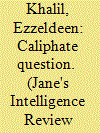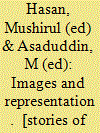| Srl | Item |
| 1 |
ID:
132823


|
|
|
|
|
| Publication |
2014.
|
| Summary/Abstract |
The emergence of the Islamic State from its previous ISIL incarnation has reshaped the international jihadist community. Ezzendeen, Khalil analyses reactions to the group's metamorphosis among Islamist militant circles and its likely evolution.
|
|
|
|
|
|
|
|
|
|
|
|
|
|
|
|
| 2 |
ID:
047104


|
|
|
|
|
| Publication |
New Delhi, Oxford University Press, 2000.
|
| Description |
vii, 349p.
|
| Standard Number |
0195651413
|
|
|
|
|
|
|
|
|
|
|
|
Copies: C:1/I:0,R:0,Q:0
Circulation
| Accession# | Call# | Current Location | Status | Policy | Location |
| 044352 | 305.8/HAS 044352 | Main | On Shelf | General | |
|
|
|
|
| 3 |
ID:
183883


|
|
|
|
|
| Summary/Abstract |
Contemporary literature reflects a newly emerging paradigm of the Arab Muslim refugee’s identity. The current conflict in the Middle East created a surge of migrants to European nations. The resulting social phenomenon enforces a series of interpersonal and international struggles for both the refugees and their hosts. In this paper, I carry out a comparative interpretation of Kamila Shamsie’s Home Fire and Mohsin Hamid’s Exit West in order to demonstrate the Arab Muslim refugee’s identity reinvention and metamorphosis in Britain, particularly in London. As I demonstrate in this paper, the many protagonists in both literary works allude to specific phases of the naturalization process, as social group’s prejudiced and stereotypical conceptualization of the ‘other’ is identified. Paradoxical accounts of empathy and apathy are recorded and conflicting social roles are highlighted. The literary works suggest the genesis of new multi-national Arab Muslim identities as potential (re)solution to the interpersonal struggles of integration.
|
|
|
|
|
|
|
|
|
|
|
|
|
|
|
|